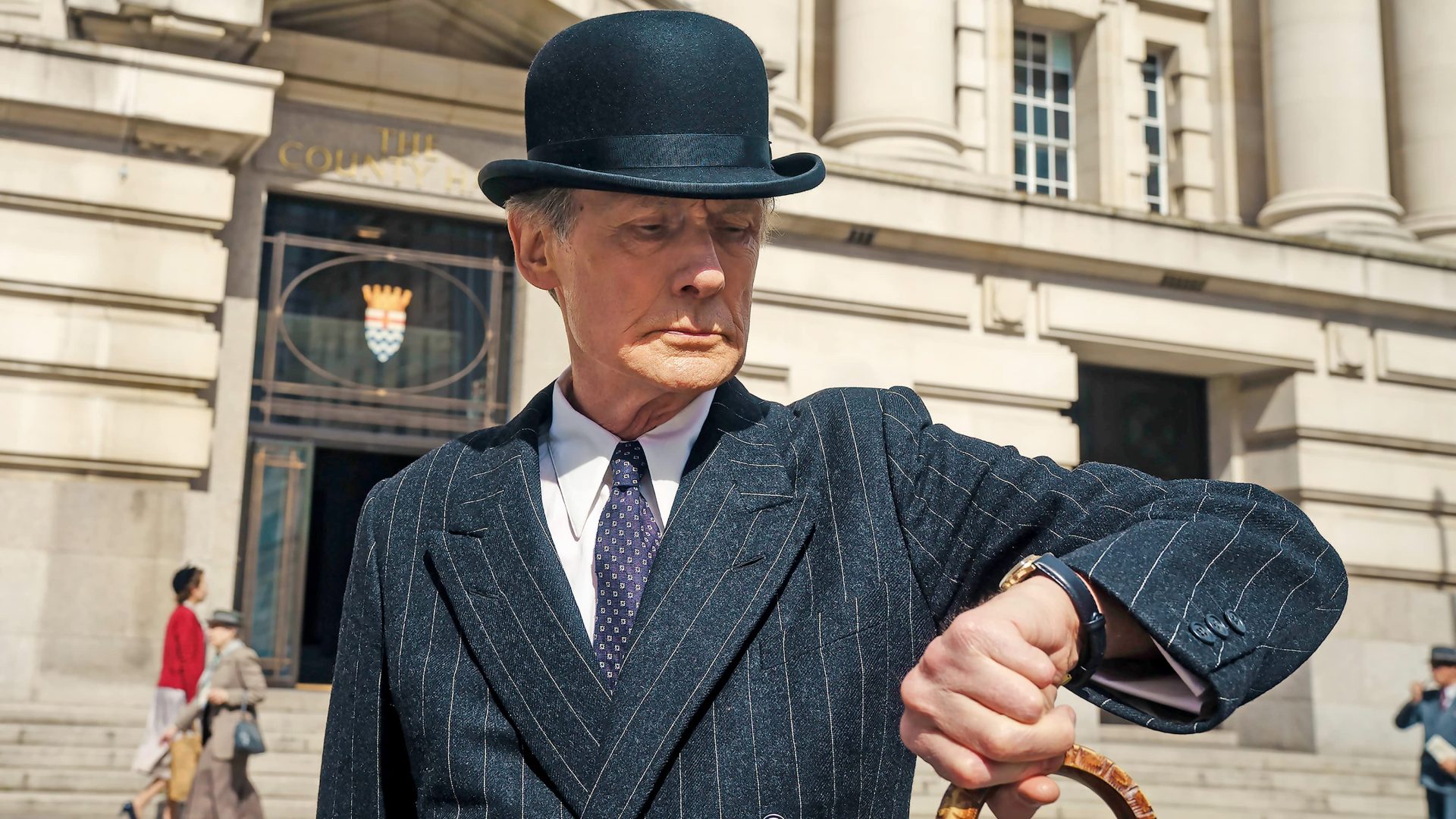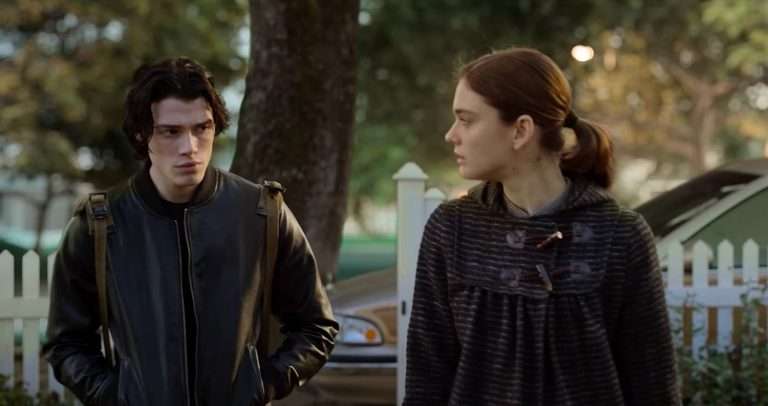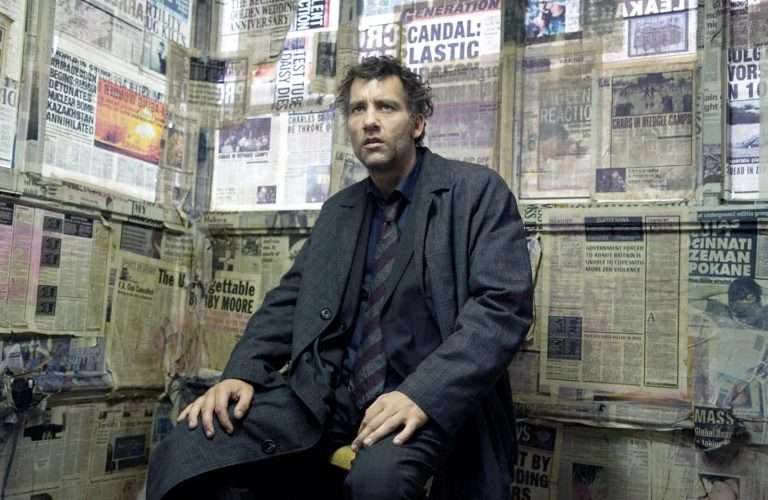Living (2022) Movie Ending, Explained: When I got really excited about “Living” after randomly coming across a 5-star review of The Guardian, I was unaware of the fact that it is, in fact, a remake of the iconic Akira Kurosawa classic Ikiru (1952). If I had known, I probably would not have felt that excitement thanks to my skepticism for remakes, that too of something like Ikiru, which drew the inspiration from Tolstoy’s. Months later, I am here because of the assignment, which I took primarily because of curiosity and secondarily for the admiration I have for the legendary Bill Nighy.
Pardon me for using too much first person, but Oliver Hermanus’s movie did hit me on a personal note, something I did not anticipate. Did the movie match the brilliance of Ikiru? Without mincing words, I am going to say no. In fact, during the opening twenty minutes, I found myself kind of lamenting the decision to take the assignment. But Nobel laureate Kazuo Ishiguro’s screenplay for Living manages to hit a home run by the end. This justifies his nomination in the adapted screenplay category at the upcoming Academy Awards. Not to mention, Nighy is top-notch as the lonely bureaucrat with a ticking clock hovering over his life.
Living (2022) Plot Summary & Movie Synopsis
London, 1953
Elated to join his new government job in the Public works department of the city council, Peter Wakeling meets his suit-wearing colleagues and boards a train to London. His earnestness for a job where the sole purpose is to do public welfare soon takes a hit thanks to his colleagues, who are all typical bureaucrats led by their boss, Rodney Williams. The only glimmer of hope among them is a young, lively woman named Margaret Harris, who befriends Wakeling. However, Ms. Harris is on the verge of happily leaving the government job and taking a position at a local restaurant very soon, about which she is very excited.
Mr. Wakeling’s first day at the job gets further dampened when he gets involved with a children’s playground petition submitted by a group of women, only to see the file traveling from department to department and ultimately ending up in Mr. Williams’ long pending stack of files.
The Diagnosis
It comes as both a shock and surprise to the group of officials when their boss Mr. Williams abruptly leaves at 3 pm, something that is extremely uncharacteristic of him. We soon find out the reason when Mr. Williams visits a doctor and finds out that he has cancer and his days are numbered.
Alone in his home, a devastated Mr. Williams reminisces about the life he had and his dead wife while contemplating breaking the news to his son Michael and daughter-in-law, Fiona. But when they return home that night, the old widower fails to find it in his heart to subject his son to such tragic news.
Shattered and heartbroken due to the diagnosis, Mr. Williams goes to a seaside town with a hefty amount of sleeping medicine in order to end his life on his own terms. But he fails to conjure the courage to do so and finds himself at a local restaurant. Upon overhearing about the trouble of an insomniac writer at the same restaurant, Mr. Williams offers his medicines to the young man. The writer, Mr. Sutherland, gets curious about the reason behind all the sleeping medicines the old man is carrying.
He eventually becomes the first person to know Mr. Williams’ secret. Moved by his candor, Mr. Sutherland takes Mr. Williams for a night out at a local pub. Amazed at finding a new way of life that was unbeknownst to him, Mr. Williams gives away his signature bowler hat and opts for a spunkier Trilby hat. That follows a deeply moving rendition of “The Rowan Tree,” the famous Scottish folk song, in the middle of which Mr. Williams breaks down in tears and leaves.
A Chance Encounter
Despite returning home from the seaside town, Mr. Williams does not go to work and continues wandering around his workplace; until he randomly stumbles into Ms. Harris one day. Ms. Harris has now moved to her new job, but she is delighted to see Mr. Williams since a good recommendation from her former boss would increase her chances of flourishing at her current workplace. Promising to write her the recommendation, Mr. Williams asks her to have lunch with him at a fancy restaurant on a whim. The generally enthusiastic Ms. Harris happily agrees to go with him, and the two of them end up having a surprisingly great time.
Ms. Harris tells him about the nickname “Mr. Zombie” that she had given him during the job, which Mr. Williams finds rather amusing. While parting their ways, Mr. Williams promises to go back to his work. Meanwhile, a nosy neighbor of the Williams sees the two of them having lunch together and reports that to Fiona. Fearing a scandal, Fiona asks Michael to confront his father, but the son fails to bring it up, just like the father.

In the public works department, files keep piling on one another. July passes by in a jiffy, and August rolls in. Despite leaving home every day, Mr. Williams still does not return to his office. One day, Margaret spots the old man sitting at her restaurant while waitressing. When the two come face to face, Mr. Williams asks her out for a movie after her shift ends. After hesitating a little, she agrees. Like the last time, the two have a ball at the movie theater, marveling at Cary Grant.
Afterward, Mr. Williams asks her out for a drink. While Ms. Harris admits to liking their time together, she also confesses that they have a huge age difference, and whatever they have between them might come off as odd. She also suggests the possibility of Mr. Williams getting infatuated with her, to which Mr. Williams agrees. He confesses to finding inspiration in her way of living, even being jealous of her because she has her whole life ahead, and he is counting his final days. He finally tells her about his illness which breaks Ms. Harris’ heart.
Back To Work And…
Surprising everyone, Mr. Williams comes back to work one day, and right after returning, he rallies his subordinates to get the children’s park done. On a rain-soaked August afternoon, Mr. Williams vigorously goes to visit the site, shocking all his colleagues.
In the winter of the same year, Mr. Williams dies. At his funeral, Michael hands over Mr. Wakeling, a confidential letter from his father. He also has a heart-to-heart with Margaret, where she reveals that Mr. Williams did know about his condition.
But the most essential thing is the Children’s Park has actually happened. The women who submitted the petition are also present at the funeral as well, along with all of Mr. Williams’s colleagues and so many others who have known the man.
Living (2022) Movie: Ending Explained
Days have passed since Mr. Williams left the world, but he is still there in every conversation. While traveling to the office on the train, Mr. Wakeling and the others argue about whether or not Mr. Williams knew about his illness, and if he did, then what a courageous man he was. Mr. Wakeling does not tell anyone about the confidential letter. However, they all end up making a pledge to fulfill their responsibilities and not letting their bureaucratic tendencies hamper their work, which happens to be public welfare.
What was in the letter?
Despite their rousing pledge on the train, they soon fall into the rabbit hole of old habits dying hard. Peter and Margaret take a liking to each other, which eventually turns into a blossoming relationship. On a day when Peter gets really disappointed at work to see everyone has completely given themselves up to the old way, we finally get to know what really was in the letter he received from Mr. Williams. It is a very simple but effective thing- just remember the playground if Peter ever feels discouraged.
Did Mr. Williams Die in Peace?
At the end of the day, Peter Wakeling visits the playground, which became a reality thanks to his former boss, the now-deceased Rodney Williams. As Peter reminisces about his short period of time with Mr. Williams, he meets a police officer. Upon knowing Mr. Wakeling was someone who used to work with Mr. Williams, the officer reveals to him that he did see Mr. Williams shortly before his death, sitting on the swing of the park on a cold winter night.
He thought about asking the old man to leave as it was really cold and chances of getting sick were pretty high for the elderlies, but seeing how happy Mr. Williams was on the swing, the officer didn’t disturb him. Since then, the officer has been carrying the guilt of letting Mr. Williams sit in that cold. But Mr. Wakeling assures him that Mr. Williams already had a terminal illness, and the officer did the right thing by letting him be, as it was probably the happiest the man has ever been. At least, that is what Mr. Wakeling believes, and so do we.
As we see a happy, smiling Mr. Williams singing “The Rowan Tree” on the swing, we realize the man, after all, did the “living” at the twilight of his life.

![The Colossus of Rhodes [1961]: Sergio Leone’s Directorial Debut](https://79468c92.delivery.rocketcdn.me/wp-content/uploads/2018/08/colossus-of-rhodes-1-768x432.jpg)
![To Leslie [2022]: ‘SXSW’ Review – An excellent Andrea Riseborough performance propels this familiar redemption story](https://79468c92.delivery.rocketcdn.me/wp-content/uploads/2022/03/To-Leslie-1-768x432.jpg)
![Racer and the Jailbird [2018]: A Soul-less and Tedious Film About Unconditional Love](https://79468c92.delivery.rocketcdn.me/wp-content/uploads/2018/05/Jaillll-768x323.jpg)


